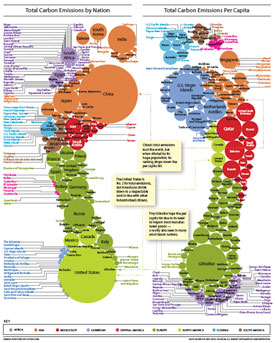The world is getting warmer, and we have to figure out what to do about it. By “we” I mean all of us humans: we are literally all in this together. The onset of our very own “anthropocene” geological era presents the biggest practical challenge that humanity has faced. How we respond to it will define our place in cosmic history: it is a golden opportunity.
In 2010, Miller-McCune magazine published a remarkable piece of data visualization (“Tracking Climate Change”) to try and help answer the question: who is responsible for climate change? A year on, and it’s still the main topic of the global conversation. The debate in Durban last week was at times quite heated; the negotiators at the climate summit in South Africa achieved something important though. For the first time, all the countries in the world are now bound together by the Durban agreement to work out a new protocol for reducing their emissions. But are our leaders moving fast enough?
When I first saw it, my eye was drawn to the graphic’s placement of the United States in the world order: it concludes that “The United States is no. 2 for total emissions but Americans shrink down to a respectable rank in line with other industrialized citizens.” The language is nice and positive, but in a curious way: the America that I know does not aim to be respectably in the middle of the pack! It’s also a fascinating reflection of the American people’s government stance: the U.S. refused to sign the Kyoto agreement because it didn’t hold developing countries to account. By now some of those countries have caught up with America’s total energy consumption, and will overtake it as they develop toward the quality of life afforded to the American people by their high per-capita energy consumption. And who can blame them? Lucky is the child born into a wealthy country!
The main message we should take away from the Miller-McCune carbon footprint diagram is is that climate change presents a global challenge. As our leaders finally admitted last week, we are literally all in this together. Take what you have learned from the scientists and imagine the world in a few decades from now, a few degrees warmer, with all the extreme weather, desertification, ocean acidification, mass migration, conflict over energy supplies, fresh water and so on, that have already begun, and that will only get worse the more we destabilize our climate system with greenhouse gases.
Then ask your future self two questions. Would you like to see that broken climate start to mend, or would you like to see it get still worse? And do you think the humans being born into that future will look back on their ancestors’ efforts at the start of their century with pride?
A year on, at the local level it’s still hard work getting people talking about the problems of climate change, and what more they could be doing to help. (When did you last write to your government representative?) We have to get moving on this: agreements between world leaders are all well and good, but it’s we, the people, who make things happen.

Forget national pride, it’s people that I’m proud of: human achievement is vast, varied, and glorious. We understand the detailed workings of the physical world on nearly all scales and in nearly all situations — atomic nuclei and our universe’s horizon are separated by more than 40 factors of ten in size! We can trace our family tree back to the common ancestor that we share with bananas, and we are using this understanding in ingenious ways to develop increasingly powerful treatments for diseases we have no right to beat. We can get on with each other: we’ve lowered our homicide rate to a small fraction of what it was just a few hundred years ago! We’ve become adept at enriching our lives, in a whole range of different ways: financially, culturally, spiritually, and aesthetically. We’ve responded to the wars that our leaders have blundered into with incredible resolve and collective strength. A few of us have even been to our moon, and there are humans living on an outpost in space while our robots explore the other planets in our neighborhood.
We can communicate with people all over the world, face to face, using amazingly complex devices that we made ourselves, out of melted sand. And we have networks that allow us to earn money in one place and give it to people in another: people we’ve never met and who may live thousands of miles away from us, yet who need it more than we do. We have the imagination and compassion to do all of this, and more.
But my species pride is in danger of suffering a serious blow. I can’t help thinking about a team of alien scientists who, with remote sensing technology more powerful than ours, discover us, and then watch us in the same way that we would watch a culture of bacteria in a laboratory petri dish, multiplying exponentially and consuming their available resources in a completely unsustainable way, and so suffering the terrible collapse in population that marks the miserable failure of all organisms who lack foresight — and it really bothers me that our discoverers might not be able to detect the fact that my species is different from the others on this planet, and that they might not name it “sapiens.”
So I don’t want to hear about climate denial, or climate alarmism: I want to talk about climate change. I want everyone in my species working together toward an achievement of truly planetary dimensions, willfully reducing the impact we have on our environment, and designing a sustainable future our descendants can be proud of. I want us to be in climate control.
Sign up for the free Miller-McCune.com e-newsletter.
“Like” Miller-McCune on Facebook.
Follow Miller-McCune on Twitter.
Add Miller-McCune.com news to your site.





